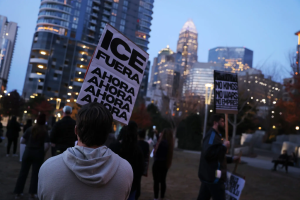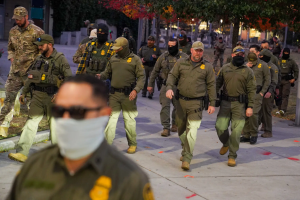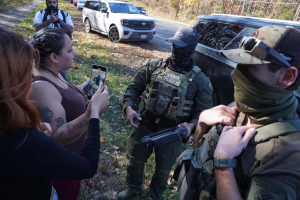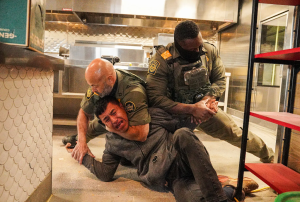In recent weeks, Charlotte has emerged as a focal point of contention regarding Border Patrol operations, illuminating the complexities of immigration policy in the United States. The city’s protests against these operations have sparked considerable public reaction, revealing a spectrum of perspectives within the community. As North Carolina navigates its status as a swing state ahead of a crucial Senate race, the implications of immigration enforcement actions have taken on heightened political significance.

Public Reactions to Border Patrol Operations
The diverse sentiments surrounding Border Patrol operations in Charlotte reflect a divided community. On one hand, some residents express support for these initiatives, believing they are essential for curbing illegal immigration and enhancing public safety. On the other hand, a significant faction of the population voices opposition, particularly concerning the aggressive tactics employed by Border Patrol agents. Critics argue that these methods foster fear within immigrant communities, leading to broader social repercussions that extend beyond mere enforcement of immigration laws.
Political Implications in North Carolina
North Carolina’s designation as a swing state adds another layer of complexity to the situation. As voter sentiment fluctuates, reactions to Border Patrol operations could sway public opinion in the upcoming Senate race between incumbent Roy Cooper and challenger Michael Whatley. The growing division over immigration enforcement may influence voter behavior, as candidates grapple with the challenge of addressing the concerns of both supporters and critics of these operations. The evolving political landscape necessitates that candidates adopt positions sensitive to local sentiments about immigration issues.

Mixed Views on Immigration Enforcement
The debate over immigration enforcement in Charlotte aligns with national political divides. Generally, Republicans have been vocal proponents of stringent immigration policies, emphasizing security and law enforcement. Conversely, Democrats have criticized the methods used, pointing out that aggressive tactics often exacerbate fear and anxiety among immigrant populations. Many residents report that these operations have led to immigrants hiding and significantly disrupting their daily lives, including their ability to access schooling for their children.
Additionally, the nature of arrests made during these operations has raised concerns. Reports show that individuals with minor offenses have been apprehended, leading to questions about the fairness and target of the operations. Such arrests not only impact those directly involved but cast a wider shadow over community relations and trust in law enforcement.

Impact on Local Communities
The consequences of the Border Patrol operations are palpable in local communities, where fear permeates daily life. Families, particularly those with immigrant backgrounds, find their routines disrupted as parents worry about potential arrests. Educational institutions also feel the impact, with declining school attendance among children from immigrant families as parents become increasingly cautious. As immigrants retreat from public spaces, the broader implications for community cohesion and cultural diversity become apparent, fueling tensions surrounding immigration policies.
Media and Community Response
The situation has garnered attention from local media outlets, which emphasize the divisions within the community. Prominent figures, including conservative pastors and community leaders, have publicly criticized the operations, arguing that they do not enhance community safety as intended. The dialogue around these protests reflects a growing recognition of the need for a more compassionate and fair approach to immigration enforcement—one that balances concerns for public safety with the rights and dignity of all citizens and residents.
Operational Scope and Arrest Statistics</em
With over 370 arrests reported in Charlotte, the operational scope of Border Patrol enforcement raises significant questions about the objectives and methods employed. Many of those arrested were simply seeking work, complicating the narrative around immigration enforcement. This statistic underscores the necessity for a nuanced discussion about immigration policies and their consequences, particularly regarding racial undertones and community trust.
Growing Tensions Around Immigration Policies
The ongoing operations have intensified discussions surrounding immigration policies, revealing their racial implications and the ethical quandaries involved. Local officials indicate that these operations may continue, keeping the community in a state of uncertainty and tension. As Charlotte navigates these challenges, the dialogue about immigration enforcement will inevitably shape the political landscape and influence voter sentiment in the upcoming Senate race.

Conclusion
In conclusion, the protests against Border Patrol operations in Charlotte showcase a polarized community grappling with complex immigration issues. The political ramifications of these reactions cannot be underestimated, especially as North Carolina prepares for a pivotal Senate race. As public sentiment evolves, the interactions between immigration policies, community safety, and political discourse will continue to play a critical role in shaping the future of the state and influencing national conversations about immigration enforcement. Addressing these issues with empathy and understanding will be essential to fostering cohesion in a divided community.
Related stories In ICE News This Week
I.R.S. Data Sharing:
A judge placed on hold an effort to deport migrants that uses typically confidential tax information, writing that the Internal Revenue Service had illegally disseminated some of the data.
Illinois Motorists:
Prosecutors moved to dismiss charges against two people who were accused of using their cars to “assault, impede and interfere with the work of federal agents” during an operation in the Chicago area.
Catholics Sue Trump Administration:
A religious nonprofit and several Roman Catholic clergy filed a lawsuit against the administration, claiming that immigration authorities had unlawfully blocked its members from ministering to people at a detention center near Chicago.
Threats to N.Y.C.:
Thomas Homan, Trump’s border czar, said additional federal agents would descend on the city if it did not help with Trump’s deportation campaign.
Blind Migrant Freed:
A man who had been arrested by ICE was released from a New York jail where he had been held without his cane, in a surprising move by an agency that rarely frees detainees.
